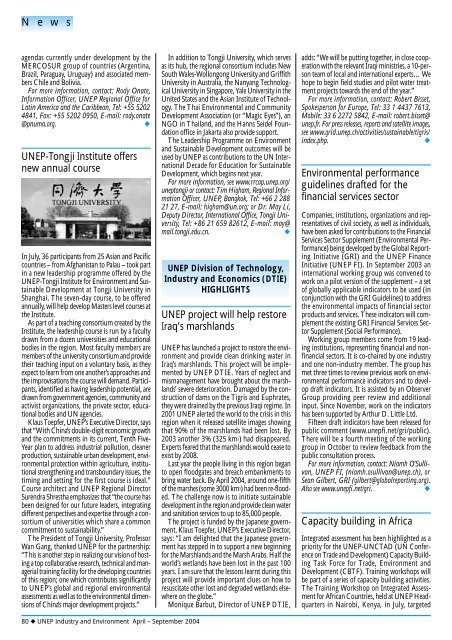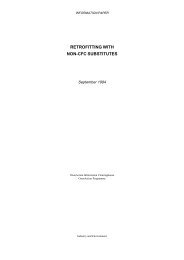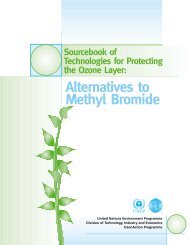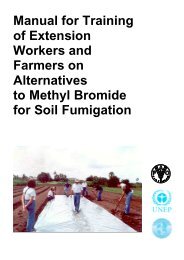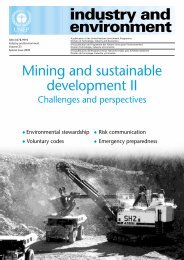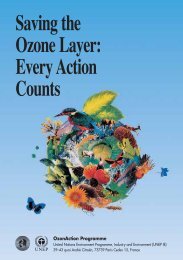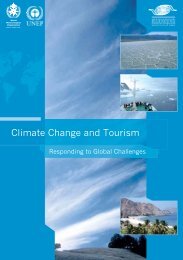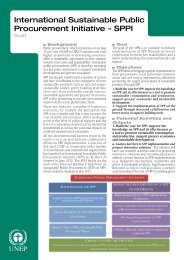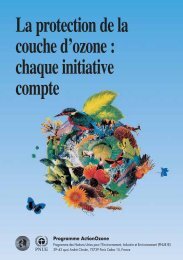industry and environment - DTIE
industry and environment - DTIE
industry and environment - DTIE
Create successful ePaper yourself
Turn your PDF publications into a flip-book with our unique Google optimized e-Paper software.
N e w s<br />
agendas currently under development by the<br />
MERCOSUR group of countries (Argentina,<br />
Brazil, Paraguay, Uruguay) <strong>and</strong> associated members<br />
Chile <strong>and</strong> Bolivia.<br />
For more information, contact: Rody Onate,<br />
Information Officer, UNEP Regional Office for<br />
Latin America <strong>and</strong> the Caribbean, Tel: +55 5202<br />
4841, Fax: +55 5202 0950, E-mail: rody.onate<br />
@pnuma.org.<br />
◆<br />
UNEP-Tongji Institute offers<br />
new annual course<br />
In July, 36 participants from 25 Asian <strong>and</strong> Pacific<br />
countries – from Afghanistan to Palau – took part<br />
in a new leadership programme offered by the<br />
UNEP-Tongji Institute for Environment <strong>and</strong> Sustainable<br />
Development at Tongji University in<br />
Shanghai. The seven-day course, to be offered<br />
annually, will help develop Masters level courses at<br />
the Institute.<br />
As part of a teaching consortium created by the<br />
Institute, the leadership course is run by a faculty<br />
drawn from a dozen universities <strong>and</strong> educational<br />
bodies in the region. Most faculty members are<br />
members of the university consortium <strong>and</strong> provide<br />
their teaching input on a voluntary basis, as they<br />
expect to learn from one another’s approaches <strong>and</strong><br />
the improvisations the course will dem<strong>and</strong>. Participants,<br />
identified as having leadership potential, are<br />
drawn from government agencies, community <strong>and</strong><br />
activist organizations, the private sector, educational<br />
bodies <strong>and</strong> UN agencies.<br />
Klaus Toepfer, UNEP’s Executive Director, says<br />
that “With China’s double-digit economic growth<br />
<strong>and</strong> the commitments in its current, Tenth Five-<br />
Year plan to address industrial pollution, cleaner<br />
production, sustainable urban development, <strong>environment</strong>al<br />
protection within agriculture, institutional<br />
strengthening <strong>and</strong> transboundary issues, the<br />
timing <strong>and</strong> setting for the first course is ideal.”<br />
Course architect <strong>and</strong> UNEP Regional Director<br />
Surendra Shrestha emphasizes that “the course has<br />
been designed for our future leaders, integrating<br />
different perspectives <strong>and</strong> expertise through a consortium<br />
of universities which share a common<br />
commitment to sustainability.”<br />
The President of Tongji University, Professor<br />
Wan Gang, thanked UNEP for the partnership:<br />
“This is another step in realizing our vision of hosting<br />
a top collaborative research, technical <strong>and</strong> managerial<br />
training facility for the developing countries<br />
of this region; one which contributes significantly<br />
to UNEP’s global <strong>and</strong> regional <strong>environment</strong>al<br />
assessments as well as to the <strong>environment</strong>al dimensions<br />
of China’s major development projects.”<br />
In addition to Tongji University, which serves<br />
as its hub, the regional consortium includes New<br />
South Wales-Wollongong University <strong>and</strong> Griffith<br />
University in Australia, the Nanyang Technological<br />
University in Singapore, Yale University in the<br />
United States <strong>and</strong> the Asian Institute of Technology.<br />
The Thai Environmental <strong>and</strong> Community<br />
Development Association (or “Magic Eyes”), an<br />
NGO in Thail<strong>and</strong>, <strong>and</strong> the Hanns Seidel Foundation<br />
office in Jakarta also provide support.<br />
The Leadership Programme on Environment<br />
<strong>and</strong> Sustainable Development outcomes will be<br />
used by UNEP as contributions to the UN International<br />
Decade for Education for Sustainable<br />
Development, which begins next year.<br />
For more information, see www.rrcap.unep.org/<br />
uneptongji or contact: Tim Higham, Regional Information<br />
Officer, UNEP, Bangkok, Tel: +66 2 288<br />
21 27, E-mail: higham@un.org; or Dr. May Li,<br />
Deputy Director, International Office, Tongji University,<br />
Tel: +86 21 659 82612, E-mail: may@<br />
mail.tongji.edu.cn.<br />
◆<br />
UNEP Division of Technology,<br />
Industry <strong>and</strong> Economics (<strong>DTIE</strong>)<br />
HIGHLIGHTS<br />
UNEP project will help restore<br />
Iraq’s marshl<strong>and</strong>s<br />
UNEP has launched a project to restore the <strong>environment</strong><br />
<strong>and</strong> provide clean drinking water in<br />
Iraq’s marshl<strong>and</strong>s. This project will be implemented<br />
by UNEP <strong>DTIE</strong>. Years of neglect <strong>and</strong><br />
mismanagement have brought about the marshl<strong>and</strong>s’<br />
severe deterioration. Damaged by the construction<br />
of dams on the Tigris <strong>and</strong> Euphrates,<br />
they were drained by the previous Iraqi regime. In<br />
2001 UNEP alerted the world to the crisis in this<br />
region when it released satellite images showing<br />
that 90% of the marshl<strong>and</strong>s had been lost. By<br />
2003 another 3% (325 km 3 ) had disappeared.<br />
Experts feared that the marshl<strong>and</strong>s would cease to<br />
exist by 2008.<br />
Last year the people living in this region began<br />
to open floodgates <strong>and</strong> breach embankments to<br />
bring water back. By April 2004, around one-fifth<br />
of the marshes (some 3000 km 3 ) had been re-flooded.<br />
The challenge now is to initiate sustainable<br />
development in the region <strong>and</strong> provide clean water<br />
<strong>and</strong> sanitation services to up to 85,000 people.<br />
The project is funded by the Japanese government.<br />
Klaus Toepfer, UNEP’s Executive Director,<br />
says: “I am delighted that the Japanese government<br />
has stepped in to support a new beginning<br />
for the Marshl<strong>and</strong>s <strong>and</strong> the Marsh Arabs. Half the<br />
world’s wetl<strong>and</strong>s have been lost in the past 100<br />
years. I am sure that the lessons learnt during this<br />
project will provide important clues on how to<br />
resuscitate other lost <strong>and</strong> degraded wetl<strong>and</strong>s elsewhere<br />
on the globe.”<br />
Monique Barbut, Director of UNEP <strong>DTIE</strong>,<br />
adds: “We will be putting together, in close cooperation<br />
with the relevant Iraqi ministries, a 10-person<br />
team of local <strong>and</strong> international experts… We<br />
hope to begin field studies <strong>and</strong> pilot water treatment<br />
projects towards the end of the year.”<br />
For more information, contact: Robert Bisset,<br />
Spokesperson for Europe, Tel: 33 1 4437 7613,<br />
Mobile: 33 6 2272 5842, E-mail: robert.bisset@<br />
unep.fr. For press releases, reports <strong>and</strong> satellite images,<br />
see www.grid.unep.ch/activities/sustainable/tigris/<br />
index.php.<br />
◆<br />
Environmental performance<br />
guidelines drafted for the<br />
financial services sector<br />
Companies, institutions, organizations <strong>and</strong> representatives<br />
of civil society, as well as individuals,<br />
have been asked for contributions to the Financial<br />
Services Sector Supplement (Environmental Performance)<br />
being developed by the Global Reporting<br />
Initiative (GRI) <strong>and</strong> the UNEP Finance<br />
Initiative (UNEP FI). In September 2003 an<br />
international working group was convened to<br />
work on a pilot version of the supplement – a set<br />
of globally applicable indicators to be used (in<br />
conjunction with the GRI Guidelines) to address<br />
the <strong>environment</strong>al impacts of financial sector<br />
products <strong>and</strong> services. These indicators will complement<br />
the existing GRI Financial Services Sector<br />
Supplement (Social Performance).<br />
Working group members come from 19 leading<br />
institutions, representing financial <strong>and</strong> nonfinancial<br />
sectors. It is co-chaired by one <strong>industry</strong><br />
<strong>and</strong> one non-<strong>industry</strong> member. The group has<br />
met three times to review previous work on <strong>environment</strong>al<br />
performance indicators <strong>and</strong> to develop<br />
draft indicators. It is assisted by an Observer<br />
Group providing peer review <strong>and</strong> additional<br />
input. Since November, work on the indicators<br />
has been supported by Arthur D. Little Ltd.<br />
Fifteen draft indicators have been released for<br />
public comment (www.unepfi.net/gri/public).<br />
There will be a fourth meeting of the working<br />
group in October to review feedback from the<br />
public consultation process.<br />
For more information, contact: Niamh O’Sullivan,<br />
UNEP FI, (niamh.osullivan@unep.ch), or<br />
Sean Gilbert, GRI (gilbert@globalreporting.org).<br />
Also see www.unepfi.net/gri.<br />
◆<br />
Capacity building in Africa<br />
Integrated assessment has been highlighted as a<br />
priority for the UNEP-UNCTAD (UN Conference<br />
on Trade <strong>and</strong> Development) Capacity Building<br />
Task Force for Trade, Environment <strong>and</strong><br />
Development (CBTF). Training workshops will<br />
be part of a series of capacity building activities.<br />
The Training Workshop on Integrated Assessment<br />
for African Countries, held at UNEP Headquarters<br />
in Nairobi, Kenya, in July, targeted<br />
80 ◆ UNEP Industry <strong>and</strong> Environment April – September 2004


